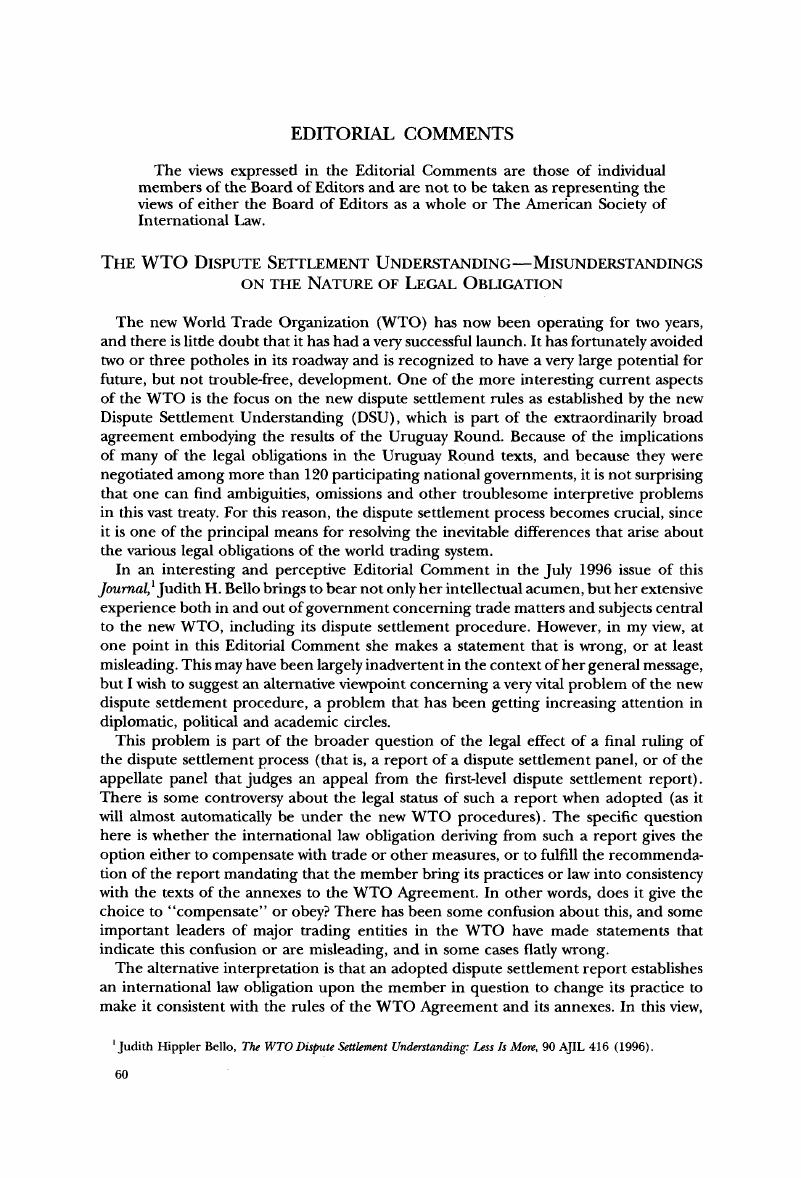Published online by Cambridge University Press: 27 February 2017

1 Judith Hippler Bello, The WTO Dispute Settlement Understanding: Less Is More, 90 AJIL 416 (1996).
2 Id. at 416–17.
3 See Restatement (Third) of the Foreign Relations Law of the United States, ch. 2, especially §114 (1987).
4 GATT B.I.S.D. (28th Supp.) at 114 (1982); John H. Jackson, William Davey & Alan O. Sykes, International Economic Relations 777 (3d ed. 1995).
5 General Agreement on Tariffs and Trade [GATT], Oct. 30, 1947, Art. XXIII, TIAS No. 1700, at 60, 55 UNTS 188, 266. See also John H. Jackson, The World Trading System, ch. 4 (1989).
6 Jackson, supra note 5, at 85.
7 Understanding Regarding Notification, Consultation, Dispute Settlement and Surveillance, Nov. 28, 1979, GATT B.I.S.D. (26th Supp.) at 210 (1980). See especially paras. 16, 21, 22; and Annex, para. 5.
8 Vienna Convention on the Law of Treaties, May 23, 1969, Art. 31, para. 3(b), 1155 UNTS 331, 340.
9 The WTO Agreement includes the following language, which could be relevant: “4. Each member shall ensure the conformity of its laws, regulations and administrative procedures with its obligations as provided in the annexed Agreements.” Agreement Establishing the World Trade Organization, in Final Act Embodying the Results of the Uruguay Round of Multilateral Trade Negotiations [hereinafter Final Act], Apr. 15, 1994, Art. XVI:4, 33 ILM 1125, 1152 (1994). However, this language appears to beg the question, since it depends on a determination as to what the provided obligations are.
10 Remember that under the new procedures there can be no blocking and therefore adoption is virtually automatic. Also remember that the report will almost always specify an obligation to bring the national practices and law into consistency with the international treaty clauses.
11 See particularly the following articles and paragraphs of the Dispute Setdement Understanding, Ann. 2 to the WTO Agreement, in Final Act, supra note 9, 33 ILM at 1226: Arts. 3:4, 3:5, 3:7, 11, 19:1, 21:1, 21:6, 22:1, 22:2, 22:8, 26:1(b).
12 I do not here address another interesting legal question of the WTO and the DSU; namely, whether the new text of the DSU imposes an obligation on states to refrain from all international law remedies for redress of a complaint other than those provided in the DSU.